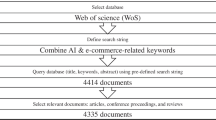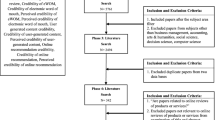Abstract
In electronic marketplaces, trust is modeled, for instance, in order to allow buying agents to make effective selection of selling agents. Familiarity is often considered to be an important factor in determining the level of trust. In previous research, familiarity between two agents has been simply assumed to be the similarity between them. We propose an improved familiarity measurement based on the exploration of factors that affect a human’s feelings of familiarity. We also carry out experiments to show that the trust model with our improved familiarity measurement is more effective and more stable.
Similar content being viewed by others
References
Bahrick H.P. (1984). Semantic memory content in permastore: fifty years of memory for Spanish learned in school. J. Exp. Psychol. Gen. 113: 1–37
Bitting, E., Carter, J., Ghorbani, A.A.: Detecting and preventing defamation in mulitagent systems. In: Proceedings of the 1st Annual Conference on Communication Networks & Services Research (CNSR’03), pp. 101–107 (2003)
Cao, H.H., Hirshleifer, D., Zhang, H.H.: Fear of the unknown: the effects of familiarity on financial decisions. In: WFA Meeting (2004)
Carter J. and Ghorbani A.A. (2004). Towards a formalization of value- centric trust in agent societies. J. Web Intell. Agent Syst. 2(3): 167–184
Carter J., Bitting E. and Ghorbani A. (2002). Reputation formalization within information sharing multiagent architectures. Comput. Intell. 2(5): 45–64
Castelfranchi, C., Falcone, R.: Principles of trust for mas: cognitive anatomy, social importance, and quantification. In: Proceedings of the International Conference on Multi-Agent Systems (ICMAS’98), pp. 72–79 (1998)
Ebbinghaus H. (1885). Memory: A Contribution to Experimental Psychology. Teachers College, Columbia University, New York
Falcone, R., Castelfranchi, C.: Trust dynamics: How trust is influenced by direct experiences and by trust itself. In: Proceedings of the Third International Joint Conference on Autonomous Agents and Multiagent Systems—Volume 2 (AAMAS’04), pp. 740–747 (2004)
Gefen D. (2000). E-commerce: the role of familiarity and trust. Omega 28(5): 725–737
Hockley W.E. (1992). Item versus associative information: Further comparisons of forgetting rates. J. Exp. Psychol. Learn. Mem. Cogn. 18(6): 1321–1330
Jøsang, A., Ismail, R.: The beta reputation system. In: Proceedings of the 15th Bled Electronic Commerce Conference (2002)
Jøsang, A., Ismail, R., Boyd, C.: A survey of trust and reputation systems for online service provision. Decis. Support Syst. 43(2), 618–644 (2005)
Kuzic J., Fisher J. and Scollary A. (2002). Electronic commerce benefits, challenges and success factors in the australian banking and finance industry. In: Wrycza, S. (eds) Proceedings of the Tenth European Conference on Information Systems, pp 1607–1616. Gdansk, Poland
Loken B. and Ward J. (1990). Alternative approaches to understanding the determinants of typicality. J. Consum. Res. Interdiscip. Q. 17(2): 111–26
Luhmann N. (1979). Trust and Power. Wiley, Chichester
Maximilien, E.M., Singh, M.P.: Agent-based trust model using multiple qualities. In: Proceedings of 4th International Autonomous Agents and Multi Agent Systems (AAMAS’05) (2005)
Miers, D.: The strategic challenges of electronic commerce. http://www.enix.co.uk/electron.htm (last modified: January 28, 2004)
Minsky, N.H.: Regularity-based trust in cyberspace. In: Proceedings of the First International Conference on Trust Management (iTrust’03) (2003)
Moreland R.L. and Zajonc R.B. (1982). Exposure effects in person perception: Familiarity, similarity and attraction. J. Exp. Social Psychol. 18(5): 395–415
Mui, L., Mohtashemi, M., Halberstadt, A.: A computational model of trust and reputation. In: Proceedings of the 35th Hawaii International Conference on System Science (HICSS’02) (2002)
Noce, A., Peters, C.: Barriers to electronic commerce in Canada: a size of firm and industry analysis. In: Proceedings of the Economic Conference—Growth, Wealth and Sustainability (2005)
Ratnasingham P. (1998). The importance of trust in electronic commerce. Inter. Res. Electron. Netw. Appl. Policy 8(4): 312–321
Resnick P., Zeckhauser R., Friedman E. and Kuwabara K. (2000). Reputation systems. Commun. ACM 43(12): 45–48
Söderlund M. (2002). Customer familiarity and its effects on satisfaction and behavioral intentions. Psychol. Market. 19: 861–879
Söderlund, M., Gunnarsson, J.: Customer familiarity and its effects on satisfaction and dissatisfaction. SSE/EFI Working Papers Series in Business Administration (no. 2000: 2)
Tran, T., Cohen, R.: A reputation-oriented reinforcement learning approach for agents in electronic marketplaces. In: Proceedings of the Eighteenth National Conference on Artificial Intelligence (AAAI’02), Doctoral Consortium, p. 989 (2002)
Whittlesea B.W.A. (1993). Illusions of familiarity. J. Exp. Psychol. Human Learn. Mem. 19(6): 1235–1253
Yonelinas A.P. (2002). The nature of recollection and familiarity: A review of 30 years of research. J. Mem. Lang. 46: 441–517
Zhang, J., Ghorbani, A.A.: Familiarity and trust: measuring familiarity with a web site. In: Proceedings of the 2nd Annual Conference on Privacy, Trust and Security (PST’04), pp. 23–28 (2004)
Author information
Authors and Affiliations
Corresponding author
Rights and permissions
About this article
Cite this article
Zhang, J., Ghorbani, A.A. & Cohen, R. A familiarity-based trust model for effective selection of sellers in multiagent e-commerce systems. Int. J. Inf. Secur. 6, 333–344 (2007). https://doi.org/10.1007/s10207-007-0025-y
Published:
Issue Date:
DOI: https://doi.org/10.1007/s10207-007-0025-y




